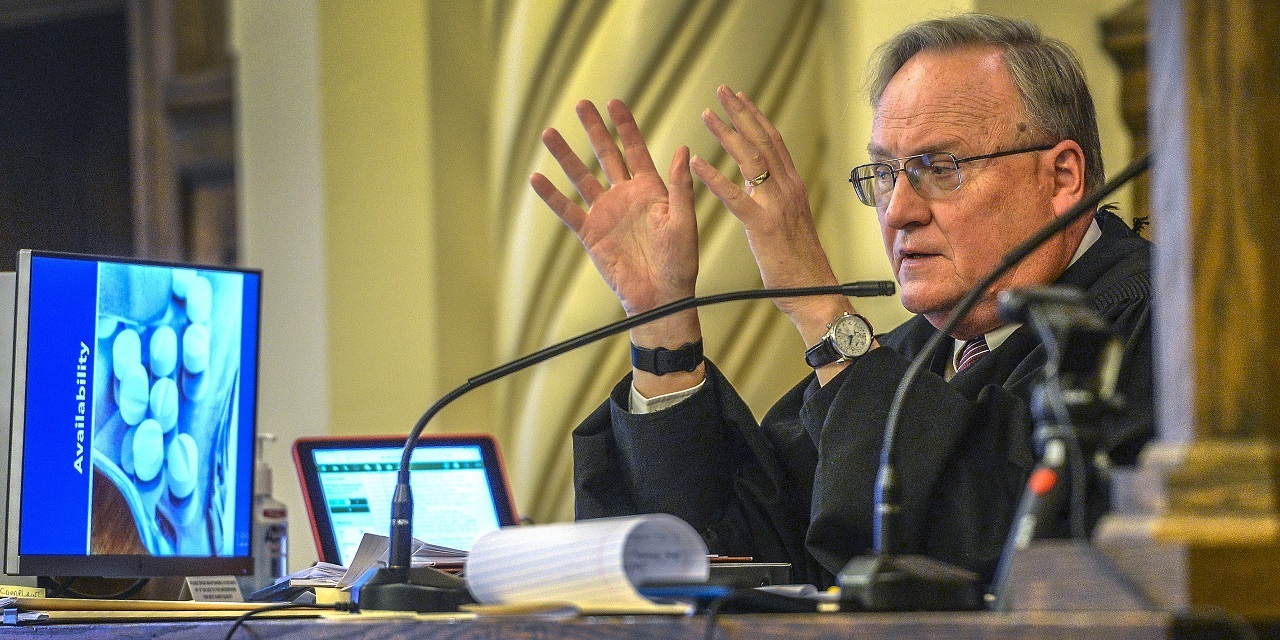A professor of pharmacy marketing told a West Virginia courtroom that the selling of opioid drugs by sales reps was designed to expand market share of the drugs and result in profits - a central argument state attorneys intend to show as the causation of an epidemic.
“It took down barriers,” Dr. Matthew Perri said. “It made opioids appear to be a natural (for pain relief).”
One of the barriers to reps selling the drugs to doctors and pharmacies Perri said was to convince them the drugs were not dangerously addictive. Warning labels did say, “May be habit forming.”
The trial is being streamed live courtesy of Courtroom View Network.
Janssen, the drug arm of Johnson & Johnson, and opioid suppliers Teva, Cephalon and Allergen, are accused of causing an epidemic in West Virginia.
West Virginia Attorney General Patrick Morrisey initially filed lawsuits against the drug manufacturers in late 2019 in the Boone Circuit Court. The case which began this week is now being heard in the 13th Judicial District Kanawha Court by a state's Mass Litigation Panel in a bench trial. Judge Derek Swope will render a verdict after what is expected to be a two-month trial.
Other state-conducted lawsuits including in Washington and Florida are being held against opioid distributors and manufacturers.
Plaintiffs’ attorneys in West Virginia are seeking to prove the companies ignored the addictive dangers of the drugs for profits, endangering the public by creating a public nuisance and violating the West Virginia Consumer Protection and Control Act. State attorneys argue that the companies recklessly promoted opioid drugs while instituting ineffective anti-drug diversion programs.
West Virginia will seek millions in damages from the defendants to fund addiction treatment programs.
Defense attorneys argue the epidemic was caused by illegal drug abuse including heroin and fentanyl, and not by manufacturing companies legally supplying doctors and hospitals with the pain pills they prescribed.
One of the original defendants was another company Endo, but Morrisey announced last month the company had settled with West Virginia for $26 million.
Lawyers for the state ran previously recorded deposition interviews of defendant company employees describing how they went about selling the drugs to their customers, clinics, pharmacies and doctors. Paula Williams, a Teva Pharma product engineer, when shown an inter-office communique that carried the advice “Sell like crazy,” dismissed the slogan.
“That was not in the best taste,” she conceded. “That was not our mission statement. It was meant to be a joke.”
Perri, a professor emeritus in pharmacy marketing at the University of Georgia, called as an expert witness by the state, indicated otherwise in his testimony on Friday.
“The goal is to generate sales,” Perri said of the defendants’ marketing efforts.
State attorneys exhibited a chart saying that under ideal circumstances marketing should be truthful and disclose the risks of addiction.
“Promotion should not be disguised as science or education,” the chart read. “Marketing should be transparent about who the companies financially support.”
Perri said the defendants had made funding contributions to pro-opioid advocacy organizations like the American Pain Society.
“Did Cephalon financially support pain organizations?” Perri was asked.
“Yes,” he responded.
“Jannsen?”
“Yes.”
“Teva?”
“Yes.”
Perri said pharmacies targeted for marketing efforts were prioritized, at the top those who made the highest number of prescriptions (in one case a two-wave direct mail campaign to the top 10,000 prescribing doctors). A 2009 sales training aid for the pharmaceutical company Actavis showed a rep holding a baseball bat as though up at the plate.
“If the pharmacy (or doctor) is not on a preferred list, is there a strategy to market to others?”
“Yes,” Perri said. “You can interact with other physicians.”
“Did you see Cephalon target third-party payers (potential customers)?”
“Yes.”
“Janssen?”
“Yes.”
“Teva?”
“Yes.”
To get the message out about an opioid drug to potential customers methods included personal selling, peer-to-peer interactions, research, publications in medical journals, education programs, influencing, and direct advertising to the consumer.
“Personal selling accounts for about half of sales and is at the top of the list,” Perri said.
Perri said the companies used their own sales reps to sell and promote the products, but also used outside firms like Quintiles, now called IQVIA, a pharmaceutical health information firm.
“How were product sales reps compensated?”
“By (meeting) goals and quotas,” Perri said.
“Bonuses?”
“Yes.”
“Does this generate more prescriptions?”
“It does.”
A document displayed by the state said the goals of such marketing efforts were to change the themes of the past, that opioid drugs were not as risky as previously thought, were effective and a first-line therapy to deal with pain. The claim was made they improved functioning.
An example was Actiq, a fentanyl-based product called a breakthrough to treat cancer. However, it was also described as a “challenging product” to sell in its infancy (2000) because it was expensive, retail availability was weak and educating the public about it would be time-consuming.
Perri said Cephalon had also promoted Actiq also as a “non-cancer” pain drug.
A recommendation on how to sell the drug was said to expand its target physician base and patient population, to allow broader penetration of a chronic pain market. From a small start in 2000, the drug had by 2006 reached sales of $600 million.
The state ran a video produced by the defendants for Fentora, a fentanyl pill. In a parody of the 1965 James Bond movie Goldfinger and its theme song by Shirley Bassey; instead of singing Goldfinger, the sung lyric went “Pain Lingers!” The promo piece copied the Bond film’s intro with individual opioid sales team members adopting heroic judo-like poses, and showed rising sales figures, $70 million, $90 million, $140 million.
Defense attorneys objected to the film being admitted as evidence. Swope overruled them.
Another video using a clip from a Jack Lemmon movie (new dialog inserted) hinted that sales reps would lose their jobs if they didn’t sell the opioid products successfully.
